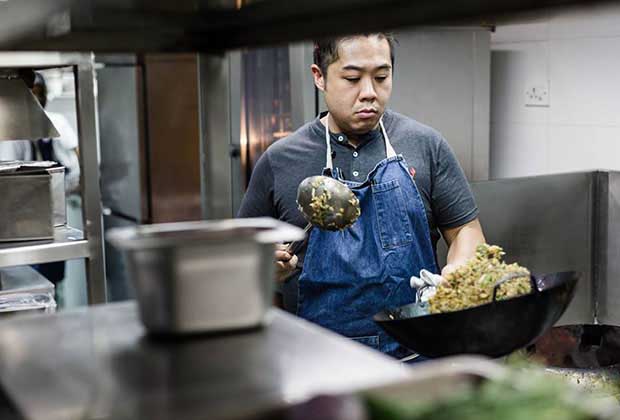Chef Kelvin Cheung: I Am Practicing To Roll A Chapaati
- By Shirin MehrotraLoading...
- | 26 July 2016 3:09 PM IST
 X
X
 Mumbai has been an adventure for Chef Kelvin Cheung. Photo via Facebook
Mumbai has been an adventure for Chef Kelvin Cheung. Photo via Facebook
He is a chef of Chinese origin from Canada, who has now made India, or Mumbai to be specific, his home. Chef Kelvin Cheung came to the city around five years ago to take the reins of the kitchen at Ellipsis in Colaba. He bid adieu to the restaurant in 2015, and left the city only to come back and open the craziest gastro pub, One Street Over, in Bandra. His latest restaurant, Bastian, celebrates the bounty of seafood the country has to offer. We speak to him about what is it in India that makes it work for him.
What makes Mumbai click for you as a chef?
Mumbai clicks for me because it's a great time to be here. It's an emerging market and people's food knowledge is rapidly expanding, which allows us a lot of creative freedom.
How has your experience been so far cooking in India? What were the difficulties and challenges?
I've only cooked in Mumbai, so I cannot comment on all of India. As for Mumbai, my experience has been an adventure and I've loved every minute of it.
The challenges have majorly been sourcing quality ingredients, maintaining equipment as many companies do not have registered partners here, and debunking food myths such as avoiding eating seafood during monsoon.
Any Indian cooking technique that you’re learning or would like to learn?
We’ve invested in a tandoor for flatbreads and I am learning how to play with that now. I am also practicing to roll the regular chapati; they laugh at me (points at his staff), but I’ll perfect it pretty soon.
How have Indian cuisine and local ingredients inspired your cooking style?
Adapting to the local produce and ingredients has always been my style of cooking, and I do prefer using seasonal ingredients, herbs, vegetables and whatever I can get my hands on.
A local or seasonal ingredient that you’re playing with right now?
Right now we’re doing stuff with arbi (colocassia) like making a lot of chips with that. We’re also playing with Amaranth greens, which are available right now.
One seafood or food trend in India that you don’t like?
I am amazed at the sheer amount of people serving basa, it’s terrible. It’s completely unhealthy because of the way it’s farmed. Imagine your bathtub at home having 200 pounds of fish. They pump in so much of hormones and steroids so these fish grow in matter of weeks living in its own waste. They have to pump in antibiotics to make sure that it’s safe to eat, so basically all you’re eating is steroids, hormones and antibiotics.
Another trend that I don’t like is the pseudo ready-to-eat seafood snacks, which is basically leftover fish pureed and mixed with chemicals, MSG, a bunch of flavourings and colours.
What was the idea behind starting Bastian?
While looking at the seafood market in Mumbai, we noticed that no one has taken the idea of the iconic restaurants like Trishna, Gajalee, Fresh Catch and the various lunch homes and done a modern take on them. What we wanted to do was take that idea and show off all the fresh and high quality seafood that we’re sourcing. We haven’t categorised our cooking based on a cuisine, ethnicity or style. We have this backwards approach where we look at the product, and figure out the best way to show it off instead of working on a cuisine and using the set ingredients and sauces.
At Bastian, you’ll find a range of dishes like Salmon Jalapeno, Tuna Poke and Lobster Rolls. Our tuna and salmon are imported sushi grade that you barely see in Mumbai. Even the indigenous fish are of extremely high quality. All of it is flown in daily from the local regions where the water is cleaner like Kochin and Chennai.
Do you think the restaurants in the city are doing justice to the seafood available here?
They’re good. But, my only problem with them is that if you order a butter garlic seafood dish, all you can taste is butter and garlic. So you don’t really taste the seafood itself. Most of our preparations at Bastian are designed in a way you can actually taste the fish; the ingredients we use elevate the seafood and not cover it up.
Are you recreating any of these Indian seafood dishes at Bastian?
At the moment no; I tread very lightly whenever I am trying to create any sort of local flavours only because I don’t want to misrepresent it unless I have taken time to study it and learned the proper techniques.
The author is a freelance food and travel writer and shares her stories on Foodchants. She is on a perpetual quest to learn about the history of regional food.



